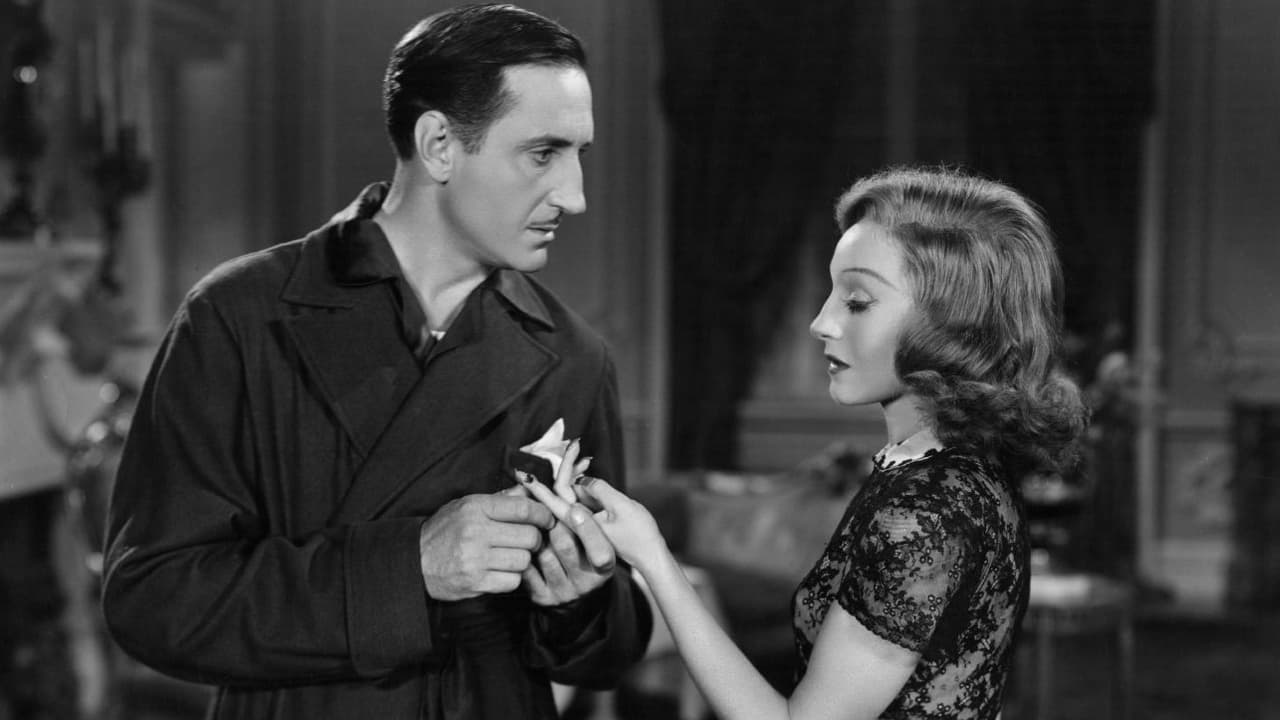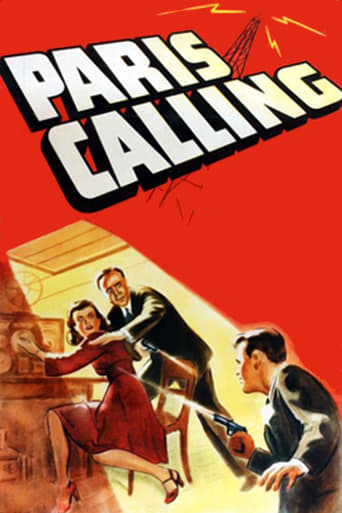

"Paris Calling" is a strange and somewhat unusual wartime movie. It tries to pack a number of plots into one film. It has a French traitor, the French underground organizing, a love triangle, the fall of Paris and rise of Vichy France, a grounded American RAF pilot, a German flyer who balks at bombing civilians fleeing Paris, a NAZI SS operation hunting the underground, and a British rescue raid. Whew! It takes a lot just to keep caught up in this film. As one might imagine, it's very choppy and bounces all over the place.I give it five stars because it forgot one thing – a concentration camp (tongue-in-cheek). Realistically, the plot tries to tackle way too much, and the screenplay can't hold all the sections together to make it halfway believable. At least one other reviewer wondered if this wasn't a comedy. While it likely wasn't intended as such, there are parts that are so far out that they are funny. By far the zaniest make-believe attempt is at the end. A lone pontoon plane takes off on a rescue mission. It doesn't encounter any aerial resistance or flak and lands in the harbor of Bordeaux. It looks like two squads of British troops get out of the plane and in short order they have knocked out a German force that has surrounded and occupies a café where all the various good guys are being arrested by the Gestapo.The movie concludes with all of those troops, and the American RAF pilot, and the heroine, and half a dozen French underground people from the café all boarding that one pontoon boat in the harbor and taking off to freedom in England. It's a hilarious scene just because it's so outlandish.Most of the roles in this film are OK. Elisabeth Bergner is Marianne Jannetier in one of her few Hollywood films. She was a very attractive British actress who didn't fare very well on the other side of the pond. As shy a character as she is here – a refined woman and concert pianist, it's a real stretch to believe that she could shoot and kill her fiancé. Basil Rathbone is that cad, Andre Benoit, who's willing to sell out his France to have a position of power in the new Nazi order.One part of the film that some may think added to humor is the role Lee J. Cobb plays. He is Captain Schwabe, a Gestapo honcho who's out to crack the French underground. His dialog and manner are hilarious at times. When he goes into Colette's Café, the known place where somehow the underground is transmitting radio messages to England, he sits at a table with another SS officer. He looks around the place and says to his comrade, "The girls don't smile, the air is bad, the music is impossible, but I like this place." Gale Sondergaard plays Colette, whose Bordeaux waterfront café is the front for the French underground. It seems to be known by everyone as such, in spite of the underground chief's regimen for secrecy. Paul Leyssac plays his character to the hilt. Randolph Scott is Lt. Nick Jordan, an American pilot in the RAF. Jordan wasn't shot down over France, but was left behind with his co-pilot as they were asleep and his unit suddenly pulled out as the Germans were advancing. As I said, there is much in this movie that is hokey.Jordan was not an Eagle Squadron member, but one of hundreds of Americans who had volunteered, were trained by and were flying in the British Royal Air Force and the Canadian Royal Air Force. He says he had flow in the Spanish war before that. The film takes place when Paris falls to the Germans on June 14, 1940. The British didn't begin forming the Eagle Squadrons until September of that year. Three Eagle Squadrons were formed by July 1941. Only 244 Americans served in them during the war. In September 1942, the units were transferred to the American Army 8th Air Force. Only four of the original 34 Eagle pilots were still in the squadrons at that time. About 100 Eagle pilots were killed, taken POW or missing by then.Many more Americans flew for the RAF and CRAF during WW II. Most of them transferred to the American Army Air Force in England after the U.S. entered the war. A wealthy Londoner, Charles Sweeney, paid for the recruiting and training of Americans to fly for the U.K. By December 8, 1941, more than 6,700 Americans had applied for and been approved to join the RAF and RCAF.One other strange thing about this movie was its release date. It had been filmed from late July to mid-September of 1941. It's premier showing was on Dec. 4 – just three days before the Japanese bombed Pearl Harbor. But, the film's general opening in the U.S. wasn't until Jan. 16, 1942. It was one of the first movies made by Hollywood with World War II action, however exaggerated and unreal.One thing to the film's credit is that for the most part none of the actors feigned German or French accents. They played it straight in English. Otherwise, the production quality of the film isn't very good. By 1941, the studios were producing much better work than this. Some suggest it was a "B" level film for Universal. Movie buffs who enjoy all aspects of films, including the changing studio logos over time, will have noticed that this film has the second Universal logo. To trumpet fanfare, a glittering ball spins with rays emitting from it, and words encircle it: "A Universal Picture."
... View MoreThis is the movie that proves that Elizabeth Bergner can deliver just as mediocre a performance under Edwin L. Marin's direction as she can when her husband, Paul Czinner, is holding the directorial reins. Admittedly, in this instance the screenwriters have come up with what must be one of the silliest scripts of all time. Sample dialogue: "It's a long chance, and dangerous!" "Oh, Marion, please! I can't bear it when you cry!" This sort of stuff even manages to daunt Basil Rathbone. And Lee J. Cobb is ridiculously miscast as a Gestapo leader. At first, I thought Lee J. was actually clowning around for laughs, but this turned out to be not the case at all. At least Charles Arnt is wide awake and wisely plays his ridiculous lines for comedy. There's a lot of misused talent behind the camera too, including superb photography by Milton Krasner, and even a sequence credited to Jean Negulesco.
... View MoreHollywood made some great movies as part of the effort to win World War II. In fact, my all-time favorite movie, and one of the greatest of American movies, Casablanca, was at least in part a result of that effort.But Hollywood also made some poor films in the same category, and this, I'm afraid, is one of them.There's nothing wrong with the acting, though the mix of accents is disconcerting at times. Elisabeth Bergner, a Viennese whose English reminds me on occasion of Luise Rainer, plays a French aristocrat. Basil Rathbone plays a French politician. Lee J. Cobb plays a Nazi officer. Only Randolph Scott, playing an American pilot, comes off naturally as what he is supposed to be. Some of the lower-ranking Nazi soldiers sound too colloquially American. I suspect that Universal just didn't have the means to hire a more convincing cast, though Rathbone and Cobb were certainly good actors. (Rathbone was a Universal staple, since that's where he made the Sherlock Holmes movies.) As others have explained, it is basically the story of Bergner, who plays a very naive woman in love with a French politician and collaborator. She at first believes the lies he tells her. With the fall of France, she sees the light, however. Thereafter she becomes involved in a Resistance cell, and works to fight the Nazis.The script isn't great, however, and sometimes the action seems disjointed. The end, as a previous viewer remarked, happens too fast and is not at all convincing. It's rather like the end of Mel Brooks' remake of "To Be or Not to Be," but to be taken seriously.Some things make no sense at all. Why, for example, would Bergner's character play very dramatic classical music in a low-life bar? If you're interested in World War II movies, you might enjoy this. It's not embarrassing. It just isn't very convincing.
... View MoreClearly Elizabeth Bergner wasn't thinking of posterity when she did her one and only Hollywood film. As a person of Jewish background who had the good sense to flee the Nazis in the early Thirties I'm sure she felt that doing this film about the early French resistance movement was patriotic in some way. Patriotic maybe, but bad and not a product that wears well, no doubt.In Paris Calling Bergner is an entertainer in love with Basil Rathbone an official of the French government. What she doesn't know, but finds out is that Rathbone has been a collaborator for years plotting to bring the Nazi ways to France. He's not even a collaborator after the fact of the invasion. In other words, a traitor and a rat. It doesn't help that Bergner's mother is killed on the way to Bordeaux where the French government and Rathbone have fled.Though it takes some time for them to accept her Bergner becomes quite the resistance worker. She's aided and abetted by downed RAF flier Randolph Scott, an American in their Eagle Squadron.Watching the film I was convinced that I was seeing a routine World War II era flag waver. But at the end when a mass escape of resistance fighters is affected after the Nazis have discovered them I just said to myself this was way too much. I had always considered Errol Flynn's escape in Desperate Journey was the ultimate in Hollywood lunacy, but this one may have topped it. I won't reveal a word, you'll have to see it evaluate for yourself.For her fans in Europe who might have got to see this after the war this had to be a painful experience. Equally so for fans in the English speaking world who saw her in Escape Me Never, Catherine The Great, or As You Like It.I'm sure Bergner wanted to forget it and it may be why she never did another Hollywood film.
... View More